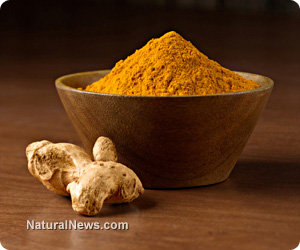
Two more reasons to take turmeric: It protects your heart, fights autoimmune disease
Wednesday, June 26, 2013 by: David Gutierrez, staff writer
Tags: turmeric, heart health, autoimmune disease
- Newly released JFK files reveal Pentagon's role in creating Lyme disease and covid in the same lab
- Trump nominates VACCINE ZEALOT Susan Monarez to lead the CDC, sidelining RFK Jr.'s reform efforts
- Obama accused of laundering USAID funds to fuel global protest movements, regime change operations
- HUGE: Putin claims 2020 election fraud in U.S. sparked Ukraine war, calls for peace talks with Trump
- Chris Rufo finally reveals abuse liberals unleashed on his wife and young kids...
- Deep State in disarray: Trump's funding freeze sows chaos, Democrats vow legal battle
- Trump shows his true colors
- STARDUST, a secretive Israeli-US startup, plans risky solar geoengineering experiment to BLOCK OUT THE SUN
- Trump's greatest betrayal so far: Accelerating Middle East wars, silencing dissent, and serving Zionist masters
- $2B Roundup verdict: A landmark blow to Bayer and a win for health freedom
- Outrageous government fraud: $312M in COVID loans went to children as young as 9 months old
- Festive flavors: The sweet history, nutritional profile and health benefits of pecan pie
- Elon Musk: Aliens could be here on Earth RIGHT NOW
- SWEET SABOTAGE: CIA's secret war on Soviet sugar revealed in JFK files
- Dr. Mike Yeadon releases 15-minute testimony - WATCH - about genocidal intent of COVID “vaccines”
- “Forever chemicals” in drinking water drive alarming cancer surge, new study warns
- Govt. agency closed by DOGE looked like a palace inside, with oil paintings fit for a KING...
- “Behind the Green Mask”: Rosa Koire exposes the hidden agenda of UN Agenda 21
- Newly released JFK files reveal Pentagon's role in creating Lyme disease and covid in the same lab
- Elon Musk: Aliens could be here on Earth RIGHT NOW
- Reclaim your health: How midlife exercise reverses years of inactivity
- Trump reverses course on Gaza plan, says “nobody is expelling Palestinians”
- EPA advisor admits the agency is funneling billions to climate groups ahead of Trump’s return to White House
- Big Pharma's $8 Billion bribery scheme exposed: how doctors are pushed to prescribe junk science, not heal
- Space war brewing? Russia threatens to destroy Starlink satellites
- A lack of integrity in Academia: Harvard professor found GUILTY of fraudulent research to promote CRT theory
- Survival 101: Effective EMF blocking techniques
- Rep. Nancy Mace introduces bill to ban biological males from female facilities on federal property
- Mike Adams Sermon 66: God will DESTROY ISRAEL for its wickedness
- Pilots report mysterious lights 'moving at extreme speeds' across Oregon skies
- 5 Simple steps to boost your brainpower: How to strengthen executive function in a distracted world
- Historian warns Israel may be entering an “IRREMEDIABLE DECLINE”
- Florida takes a stand: DeSantis proposes permanent ban on mRNA vaccine mandates
- RFK Jr.'s SSRI antidepressant investigation sparks liberal meltdown, exposes Big Pharma's dangerous game
- OpenAI whistleblower who dissented against how the company trained ChatGPT found dead
- Sugarcane extract superior to cholesterol-lowering drugs?
- EPA advisor admits the agency is funneling billions to climate groups ahead of Trump’s return to White House
- The Health Ranger releases “Vaccine Zombie” song and music video, using AI-animated zombies for the music video
- California's social media censorship law struck down: A victory for free speech or a threat to online safety?
- Dr. Mike Yeadon releases 15-minute testimony - WATCH - about genocidal intent of COVID “vaccines”
- The pandemic as a tool for INDOCTRINATION: Understanding “The Indoctrinated Brain” by Dr. Michael Nehls
- Mike Adams releases country western hit single: Goin’ Back in Time is Comin’ Home
- Mike Adams releases music poetry sensation: A Child of God
- RFK Jr. clears key hurdle: Sen. Susan Collins backs controversial HHS nominee, signaling a new era for health policy
- Florida takes a stand: DeSantis proposes permanent ban on mRNA vaccine mandates
- Unpacking the Lies That We’ve Been Fed – new song and music video released by Mike Adams, the Health Ranger
- Mike Adams releases new song and music video: Nothing More Disgusting Than a Globalist
- Congratulations to the FULLY UNVACCINATED as you resisted the COVID-19 PROPAGANDA MACHINE fueled by over $100 BILLION
- “Why we influenced the 2020 elections”: Facebook files reveal the coordinated effort to bury the Hunter Biden laptop story
- Michigan sheriff announces criminal investigation into 2020 election crimes, Dominion Voting Systems
- Israeli soldiers accused of even more torture and abuse in the West Bank
- Migrants are taking advantage of recent hurricanes to scam residents and loot their homes
- House Intelligence Committee calls for the ARREST and PROSECUTION of Dr. Anthony Fauci
- Peter Rost exposes Big Pharma corruption in his book “The Whistleblower: Confessions of a Healthcare Hitman”
- Red Cross issues warning to stop blood plasma donations from vaccinated people
- Scientists confirm: GENIUS brain function can be spontaneously unleashed in humans without any apparent cause
- EPA advisor admits the agency is funneling billions to climate groups ahead of Trump’s return to White House
- HYSSOP: What research reveals about the health benefits of this ancient holy herb
- Two containers with completed ballots fall out of truck in Florida
- Fully vaccinated about to see “tsunami” of illness and death, warns virologist
- Global leaders unite to clamp down on “misinformation” with UN-backed Cascais Declaration
- BREAKING: 2025 NDAA authorizes mandatory military draft of WOMEN across America… as Pentagon pursues global NUCLEAR war with both Russia and China at the same time
- Michael Yon warns of a ZIONIST TAKEOVER in Trump’s second administration
- BOMBSHELL: DNA testing kits are a SCAM to develop ethnic-specific bioweapons
- Ozempic and Wegovy weight loss drugs are injectable LIZARD VENOM PEPTIDES that may unleash a devastating wave of organ failure… side effects align with symptoms of SNAKE BITES
- Israeli soldiers accused of even more torture and abuse in the West Bank
- These 13 countries just signed an agreement to engineer a global FAMINE by destroying food supply
- NASA admits that climate change occurs because of changes in Earth’s solar orbit, and NOT because of SUVs and fossil fuels
- RFK Jr. clears key hurdle: Sen. Susan Collins backs controversial HHS nominee, signaling a new era for health policy
- Sermon 30: How Jesus reveals Caesar’s FAKE CURRENCY and FALSE AUTHORITY
- Coriander seeds: Ancient medicine backed by modern science
- Arizona officials claim Maricopa County needs 10-13 days to tabulate results of the election
In a study published in the journal Biological and Pharmaceutical Bulletin in 2011, researchers from Niigata University of Pharmacy and Applied Life Sciences in Japan found that three weeks of supplementation with the turmeric compound curcumin significantly improved cardiac health in male rats who had been given an injection to induce an autoimmune disease of the heart (autoimmune myocarditis). The rats supplemented with curcumin also showed a reduction in the area of the heart covered by inflammatory lesions and a reduction in the heart's weight-to-body-weight ratio.
"Our results indicate that curcumin has the potential to protect against cardiac inflammation through suppression of IL-1beta, TNF-alpha, GATA-4 and NF-kB expresses, and may provide a novel therapeutic strategy for autoimmune myocarditis," the researchers wrote.
Turmeric has the distinction of being both one of the most widely used culinary spices and traditional medicines in the world. Its benefits have been well studied by Western scientists, who attribute much of its disease-fighting prowess to a trio of naturally occurring yellow-orange chemicals called the curcuminoids (and sometimes known simply by the name of the most famous of them, curcumin).
As good for your heart as exercise
Turmeric is not just good for the hearts of people with autoimmune myocarditis; in fact, several studies conducted by researchers from the University of Tsukuba in Japan suggest that it may be as beneficial for your heart as aerobic exercise!In a pair of studies published in the journals Artery Research and Nutrition Research in September and October 2012, respectively, the researchers found that women who took a curcumin supplement showed as much improvement in two measures of heart health (vascular endothelial function and arterial compliance) as women assigned to a moderate aerobic exercise training program. An even greater benefit was seen, of course, in those who took the supplements and engaged in the exercise program as well.
In another study, published in the American Journal of Hypertension in June 2012, the researchers found that a combined exercise and curcumin program significantly slowed age-related degeneration in the heart.
Turmeric battles hard-to-treat autoimmune conditions
Because turmeric is such a potent antioxidant and anti-inflammatory, numerous studies have been conducted to see whether it could be effective in reducing the severity of inflammation-based autoimmune diseases.In autoimmune diseases, the body is attacked by its own immune system. These diseases are still poorly understood, and most of them have no known cause or cure. Common autoimmune diseases include type 1 diabetes, inflammatory bowel disease (including ulcerative colitis and Crohn's disease), rheumatoid arthritis, psoriasis, multiple sclerosis, myocarditis, thyroiditis, uveitis, systemic lupus erythromatosis and myasthenia. An estimated 5 percent of the world's population suffers from an autoimmune disease.
According to a research review published in the journal Advances in Experimental Medicine and Biology in 2007, curcumin has been shown to reduce the symptoms of inflammatory bowel disease, multiple sclerosis, rheumatoid arthritis and psoriasis in humans or animals. As expected, symptomatic relief comes, at least in part, from the regulation of inflammation pathways.
It should be noted that the body absorbs curcumin most effectively from turmeric root, rather than from supplements. In addition, the maximum benefit to nutraceuticals typically comes when they are consumed at low doses over a long period of time. Nevertheless, at least one trial suggests that daily curcumin doses of up to 8 g might be safe for up to four months or longer.
Sources for this article include:
http://www.vitasearch.com/get-clp-summary/39835
http://www.naturalnews.com
http://www.jointmints.com
https://www.naturalnews.com/040330_turmeric_heart_health_curcumin.html
Turmeric at FETCH.news
Get independent news alerts on natural cures, food lab tests, cannabis medicine, science, robotics, drones, privacy and more.
Take Action: Support Natural News by linking to this article from your website
Permalink to this article:
Embed article link: (copy HTML code below):
Reprinting this article:
Non-commercial use OK, cite NaturalNews.com with clickable link.
Follow Natural News on Facebook, Twitter, Google Plus, and Pinterest
Science News & Studies
Medicine News and Information
Food News & Studies
Health News & Studies
Herbs News & Information
Pollution News & Studies
Cancer News & Studies
Climate News & Studies
Survival News & Information
Gear News & Information
News covering technology, stocks, hackers, and more



"Big Tech and mainstream media are constantly trying to silence the independent voices that dare to bring you the truth about toxic food ingredients, dangerous medications and the failed, fraudulent science of the profit-driven medical establishment.
Email is one of the best ways to make sure you stay informed, without the censorship of the tech giants (Google, Apple, Facebook, Twitter, YouTube, etc.). Stay informed and you'll even likely learn information that may help save your own life."
–The Health Ranger, Mike Adams













































